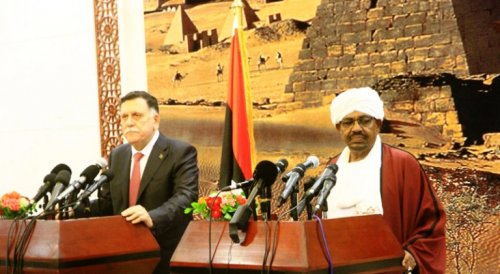Libya, Sudan agree on more cooperation in border security

The Sudanese President Omer al-Bashir Sunday has underscored his country’s keenness to achieve security and stability in Libya describing ties between the two countries as “eternal and historical”.
Speaking at a joint press conference at the end of the talks with the visiting Prime Minister of Libya’s internationally recognised Government of National Accord (GNA) Fayez al-Sarraj, al-Bashir said they seek only to achieve the interests of the Libyan people.
He pointed out that al-Sarraj’s visit to Khartoum is “a new starting point in relations between the two countries”, saying Sudan had supported the Libyan people during the revolution.
Al-Bashir further expressed regret over the recent developments in Libya, pointing to its adverse impact on Sudan particularly with regard to illegal migration and cross-border crime.
He added the presence of Sudanese mercenaries in the Libyan territory also poses a direct threat to Sudan.
Last May, two Darfur armed groups attacked the Sudanese forces in North and East Darfur states. Khartoum says the rebels launched their attack on North Darfur from Libya and accused the General Khalifa Haftar, the leader of the self-styled Libyan National Army (LNA) of supporting them.
For his part, the Libyan premier stressed that Sudan represents “a strategic depth” to Libya, pointing to the distinguished relations between the two countries.
He added the brotherly relations were not adversely impacted by the events in Libya, saying the two sides would work together to learn from the mistakes of the past.
Al-Sarraj further said his meeting with al-Bashir discussed the security and political challenges facing Libya and ways to end the crisis through national reconciliation, pointing out that his country is at “a critical stage”.
He added the meeting also discussed the need to secure the border between the two countries and activate the agreements in this regard as well as activating the mechanisms of the Sudanese-Libyan integration.
The GNA, which formally came into being in March 2016, has been struggling to unify the war-ridden North African nation and exert its control over its entire territory.
However, its task is complicated by the presence of a parallel government operating out of eastern Libya, backed by local militias and units of the LNA.
Following the fall of Muammar Gaddafi’s 40-year-rule in 2011, Libya has slid into chaos and has become the most important transit country for illegal migrants to Europe. Also, Islamic State (ISIS) presence in Libya has become a source of threat not only to its neighbouring countries but also to Europe.
In May 2016, Khartoum proposed to establish a joint force to monitor the common borders between Sudan and Libya to curb the movement of Darfur rebels and fight against illegal migration and terror groups.
(Source: Sudan Tribune)
How to submit an Op-Ed: Libyan Express accepts opinion articles on a wide range of topics. Submissions may be sent to oped@libyanexpress.com. Please include ‘Op-Ed’ in the subject line.
- HoR speaker, UN envoy meet on unity push - January 21, 2025
- New Oil Well Bolsters Libya’s Production Capacity - January 21, 2025
- Turkish TPAO Poised to Invest ‘Billions’ in Libya - January 20, 2025


